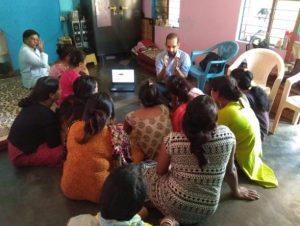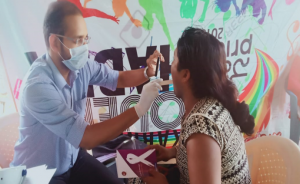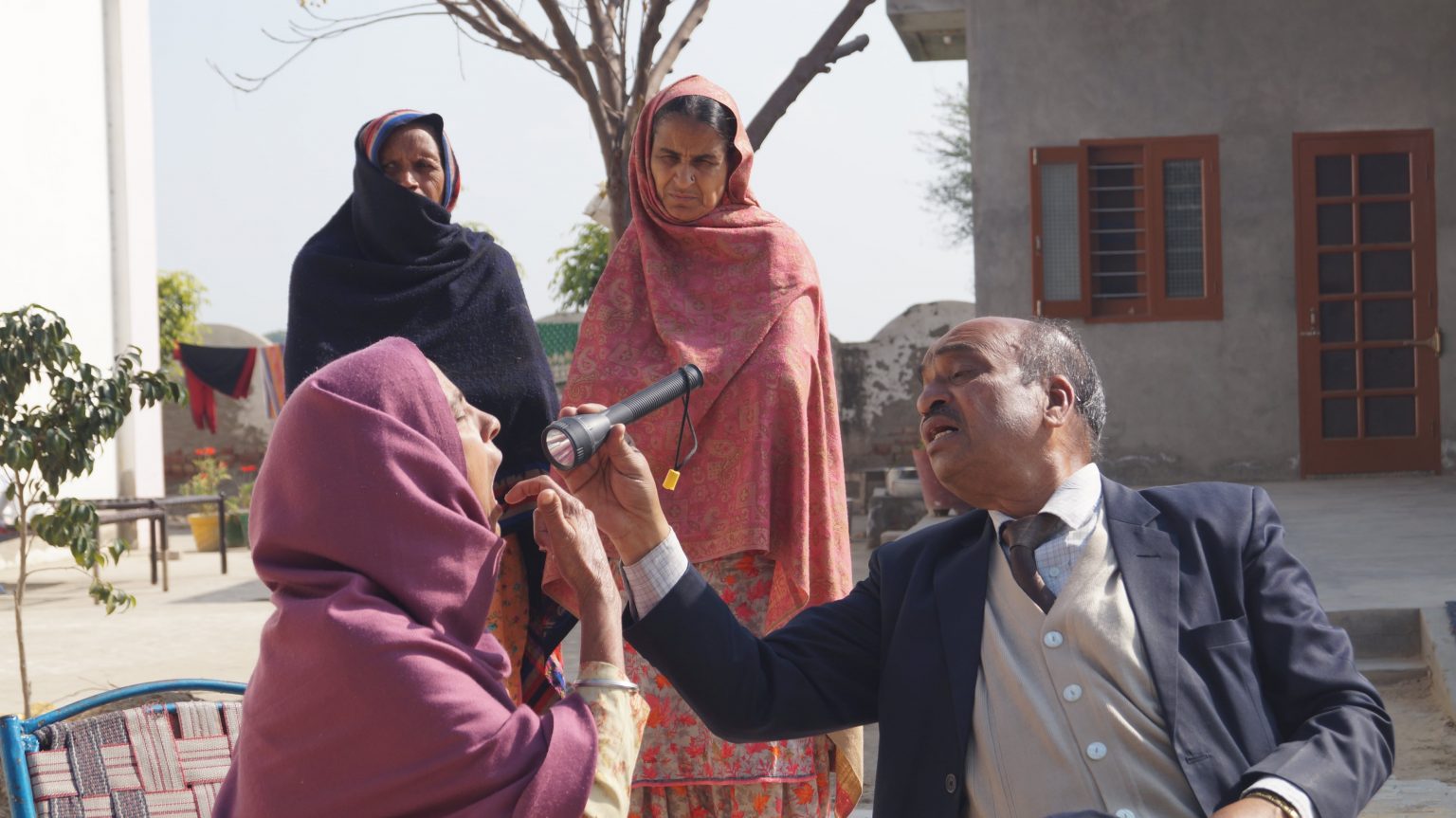OneStage has supported programmes aimed at cancer screening and awareness generation among the communities to mitigate the deadly disease and reduce the incidence of cancer in India Anish Sengupta write about the various initiatives
Cancer is a crippling disease. It can destroy an entire family sending it down a spiral of economic and emotional turmoil. Early detection and treatment of cancer, however, can to a significant extent, increase chances for survival of the patients. This particularly holds true for cases detected with cancers of the breast, cervix, mouth, larynx, colon, rectum, and skin.
After cardiac diseases, cancer has emerged as an important cause of morbidity and mortality in India. According to The National Centre for Disease Informatics and Research of the Indian Council of Medical Research (ICMR) at Bengaluru, India, 1.45 million cases of cancer were estimated to be diagnosed in 2016.

According to the World Health Organisation (WHO), there are two major components of early detection of cancer: awareness for early diagnosis and screening. There are certain recognisable warning signs of cancer, which call for prompt action. Some of them are listed out by WHO: Some early signs of cancer include lumps, sores that fail to heal, abnormal bleeding, persistent indigestion, and chronic hoarseness.
OneStage has come forward to respond to the alarming situation through its interventions designed to support communities by early detection of cancer through proper screening (particularly for breast and cervical cancers among women, oral cancers among men and transgendered individuals) and raising awareness about cancer. The intervention annually impacts nearly 23,000 beneficiaries, spread across the States of Delhi, Karnataka, Kerala, Maharashtra, Punjab, Tamil Nadu and Uttar Pradesh.
Tobacco cessation counselling to patients from Oral Cancer Screening
Studies have shown that consumption of tobacco is on the rise across India. Kicking the habit is not easy for people, despite the widespread awareness that tobacco is one the most significant, albeit preventable, cause of premature death. Therefore, there is a pressing need for Tobacco Cessation Counselling (TCC). To address these issues, OneStage and Oracle supported the Indian Cancer Society (ICS) in Bangalore district of Karnataka to start a TCC as a part of cancer screening.
A beneficiary is met not once, but several times –at the first visit, a smear is tested from the oral cavity for educative and investigative purposes. During the second visit, the beneficiary is educated on the various harmful effects of tobacco, followed by personalized counselling based upon the oral smear reports. A brief intervention form is taken. Booklet with details and methods of cessation is given to the individual, along with practical hints to successfully quit the deadly habit. A follow up visit is scheduled after three months, in order to provide the individual sufficient time to make changes to his/ her habits. The next steps of counselling are identified, based on the progress made and on the specific needs of the individual. The Individuals are monitored for about a year.

Besides this, regular cancer screening camps are organized by Indian Cancer Society at the Cancer Detection Centre in Bangalore. So far 20 early cancer detection camps that serve low-income people have been conducted in the past year with about 1,150 beneficiaries in the year 2019-20. The programme now aims to expand operations to support 150 more screening camps across the state of Karnataka.
Oral Cancer Screening for transgender community
Another unique programme was oral cancer screening camps where one of the target groups were the transgender communities. Held between April 2018 to March 2019, the camps were supported by ICS, and supported by OneStage and Oracle.
Transgender are individuals of any age or sex whose appearance, personal characteristics, or behaviors differ from stereotypes about how men and women are ‘supposed’ to be. Transgender people have existed in every culture, race, and class since the story of human life has been recorded. They are usually looked down by the society. It was seen that they often face discrimination in the field of employment & education. They were forced to leave their home and are deprived of basic health facilities. This situation creates an environment that leads to depression, tobacco and alcohol abuse. More often they end up begging on the streets or get into prostitution.
With this background, ICS, Bangalore decided to start an awareness and Cancer Screening programme in their Community in association with Ondede — an NGO group run by Transgendered people, which work for HIV and SRS (Sex Reassignment Surgery).
This initiative helped in creating awareness and in understanding the problems of the community at the ground level so that a Screening module can be formulated based on the needs of the Transgender community.
One of the major Risk factors for Cancer is tobacco – which is used abundantly in the community; almost 90 percent of the individuals are consuming tobacco in some or the other form. They also go through Sex Reassignment Surgery (SRS) which makes them vulnerable for hormone abuse which is a risk factor for breast cancer.
So as a pilot project the screening team conducted a cancer screening camp for a small group of Individuals where oral and breast cancer was given the focus, and as expected the pre-cancerous lesion for oral was high due to increased tobacco consumption. Taking this forward Indian Cancer Society started conducting regular cancer screening camps for the transgender community and will be looking forward to reach more such communities in other places of Karnataka.
Other initiatives
Under the ongoing Ganga to Kaveri Cancer Screening project implemented by ICS, underprivileged women from Maharashtra, Karnataka, Tamil Nadu, Kerala and Delhi, are screened for commonly occurring cancers like breast, cervical and even oral cancer. The programme also includes pap-smear test and mammography for the suspected cases. Supported by AstraZeneca, the programme saw the successful screening of 4,300 women beneficiaries in the past year. This year the programme aims to screen 5,000 more women beneficiaries.
Besides this, OneStage partnered with Make A Wish (MAW) Foundation and with support from AstraZeneca, to run a wish granting programme for 300 critically ill children, majority of whom are suffering from various forms of cancer. The programme saw inclusion of critically ill children between the ages three to 18.
The state of Punjab in North India has been seen to have the highest prevalence of cancer among farmers and other underserved communities. Global Cancer Concern India (GCCI) with support from OneStage and Oracle organized early cancer detection camps. Besides this, palliative homecare was provided to the beneficiaries along with counselling, pain relief, and symptom management. The programme targeted the underserved communities in Bhatinda and Ludhiana districts of Punjab.
In Tamil Nadu, Oracle and OneStage supported the Jeewan Stem Cell Foundation in Chennai. The Oracle grant will help to recruit 1,000 bone marrow donors and type their Human Leukocyte Antigen (HLA) and add to the database. This programme will increase the chances of finding a match for Indians with blood cancers and Thalassemia.
(With inputs from Ashish Dhar Raina)
Search
Categories
Recent Posts
- A brief visit to a project site in Gurugram
- How was OneStage born?
- ‘The plight of people moved me, and the heroic efforts of frontline workers inspired me to support COVID Relief work’
- 7 ways to take care of your Mental Health during the pandemic
- 5 things you must keep in mind before forwarding information on COVID
